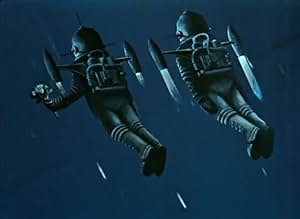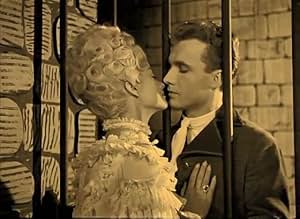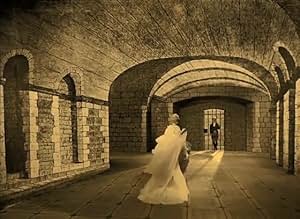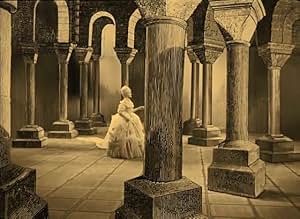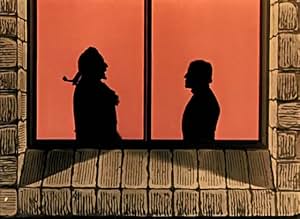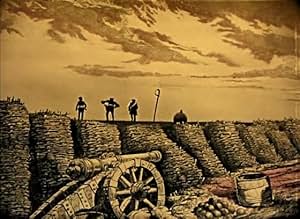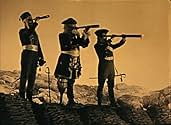IMDb RATING
7.7/10
3.4K
YOUR RATING
The outrageous Baron Munchausen tells of his many adventures, from meeting the Man in the Moon to defeating a Turkish army all by himself.The outrageous Baron Munchausen tells of his many adventures, from meeting the Man in the Moon to defeating a Turkish army all by himself.The outrageous Baron Munchausen tells of his many adventures, from meeting the Man in the Moon to defeating a Turkish army all by himself.
- Awards
- 1 win total
Nadezda Blazícková
- Court Dancer
- (as Nadesda Blazickova)
Featured reviews
Karel Zeman was a genius if visual artistry. His playful use of 19th century engravings in a live-action movie is so original and it works so well. Everybody who praises the Gilliam's Munchhausen should hold the judgement until he sees this Munchhausen. If anybody from the video industry watches this database, please make this movie available at least on VHS. And once you are at it, I would add two more Zeman's films that are made with the same charm, technical wizardry, nostalgia and artistic vision: Vynalez zkazy (1958) ("The invention of Destruction" in English) and Blaznova kronika (1963) ("The Fools' Chronicles"). In the chronological order, I consider the three films a loose trilogy that uses the esthetics of the 19th, 18th, and 17th century, respectively, to study the timeless human situation.
10gott-1
"Baron Munchausen" ("Baron Prasil" in Czech) is one of the most charming and poetic movies among those thousands which I saw ...
It is that very rare kind of movie I love to see for dozen and dozen of times, in virtually any mood and time ...
Old illustrations by Gustave Dore brought to life by an unforgettable visual imagination of Karel Zeman ...
Everything dressed in a soft melancholy of an enchanting music by great Zdenek Liska, so simple and sophisticated at the same time...
Though Zeman is mostly painting his magic world by his unique visual creativity, those able to understand the Czech dialogues get another lovely dimension, inhabited by fine jokes and never-tiring games with words...
And of course, Milos Kopecky as the Baron is the very symbol and soul of Munchausen ...
An essential classic movie for every true film fan (not recommended for nervous consumers and victims of Hollywood moneymakers, however).
How much those modern versions of Munchausen (and whatever are their modifications and names) miss the point of this magic Zeman's version: its fundamental visual craftsmanship, soft melancholy of a fable, an inspired music, and everything in a perfect union ...
How poor and tedious is 99.99% of that Hollywood stuff in comparison with this Zeman's masterpiece ...
No, they cannot do such a movie any more with all those naturalistic computer tricks, but a total lack of Karel Zeman's insight and visual poetry...
It is that very rare kind of movie I love to see for dozen and dozen of times, in virtually any mood and time ...
Old illustrations by Gustave Dore brought to life by an unforgettable visual imagination of Karel Zeman ...
Everything dressed in a soft melancholy of an enchanting music by great Zdenek Liska, so simple and sophisticated at the same time...
Though Zeman is mostly painting his magic world by his unique visual creativity, those able to understand the Czech dialogues get another lovely dimension, inhabited by fine jokes and never-tiring games with words...
And of course, Milos Kopecky as the Baron is the very symbol and soul of Munchausen ...
An essential classic movie for every true film fan (not recommended for nervous consumers and victims of Hollywood moneymakers, however).
How much those modern versions of Munchausen (and whatever are their modifications and names) miss the point of this magic Zeman's version: its fundamental visual craftsmanship, soft melancholy of a fable, an inspired music, and everything in a perfect union ...
How poor and tedious is 99.99% of that Hollywood stuff in comparison with this Zeman's masterpiece ...
No, they cannot do such a movie any more with all those naturalistic computer tricks, but a total lack of Karel Zeman's insight and visual poetry...
It begins with cosmonaut Rudolf Jellinek landing on the moon. He follows footprints which lead him to the gentlemen of Jules Verne's expedition. They introduce him to their seniors on the site: Cyrano de Bergerac and the Baron Munchausen. Munchausen takes the Moon Man (for so he must be) on a trip to the Earth in what appears to be the 18th century. There they rescue the fair princess Jana Brejchová from the Sultan of Turkey and go on a series of imaginative adventures.
It must have been a dangerous movie to produce in Czechoslovakia in 1962. It celebrates imagination. It's not even imagination in the service of anything except itself. It's the imagination of a boy, just looking up from his loved library of Jules Verne and Alexandre Dumas and noticing girls for the first time. The set designs reinforce this. They look like Dore steel engravings, and the stock is toned, occasionally for what seems to be early two-strip Technicolor, with flashes of bright colors. Munchausen fights ten thousand bashi-bazouks; he flies about on cannonballs and dwells in a whale for months. He does whatever he pleases, as the fancy strikes him, and Jellinek follows along. Will he ever develop an imagination of his own?
It's clear to me that Terry Gilliam mined this movie extensive for his own MUNCHAUSEN; there are too many settings and incidents for it to be otherwise. He would have been 24 when it premiered in the US at Pacificon. I have no doubt that he saw it there and it left an impression in his mind at least as great as in my own.
It must have been a dangerous movie to produce in Czechoslovakia in 1962. It celebrates imagination. It's not even imagination in the service of anything except itself. It's the imagination of a boy, just looking up from his loved library of Jules Verne and Alexandre Dumas and noticing girls for the first time. The set designs reinforce this. They look like Dore steel engravings, and the stock is toned, occasionally for what seems to be early two-strip Technicolor, with flashes of bright colors. Munchausen fights ten thousand bashi-bazouks; he flies about on cannonballs and dwells in a whale for months. He does whatever he pleases, as the fancy strikes him, and Jellinek follows along. Will he ever develop an imagination of his own?
It's clear to me that Terry Gilliam mined this movie extensive for his own MUNCHAUSEN; there are too many settings and incidents for it to be otherwise. He would have been 24 when it premiered in the US at Pacificon. I have no doubt that he saw it there and it left an impression in his mind at least as great as in my own.
In effect, the other commentary of this movie says everything that could be say for this excellent movie. I want to say that this movie and "On the comet (Na komete) are two of the best animation movies that I ever saw. I saw this movie in 35 mm at "Cinemateca Uruguayan" because there was playing a Karel Zeman's homage, but I think that it's necessary to review this classics films and to get it on VHS or DVD. Zeman is a genius director with the mix of animated stop-motion frames and people, filming in studios or in natural locations and also drawing over the negative, painting it, all the technics are used with masterly.
Live action with stop-motion and puppet animation. A modern astronaut meets Baron Munchausen on the Moon after landing his spacecraft there. The entire film has a quaint, charming 19th-Century look, mood and feel, thanks to the Baron himself narrating the picture, and some of the most imaginative production design, special visual effects and movie sets ever put on celluloid. Like his previous film, The FABULOUS WORLD OF JULES VERNE (AN INVENTION FOR DESTRUCTION), Zeman uses 19th-Century woodcut engravings modeled after those of Gustav Dore as his guides for most of the intricately-fashioned backdrops in this marvelous movie. Highly imaginative in every way possible, this film is like a turn-of-the-century Georges Melies nickelodeon reel in appearance, but has a mysterious, mystical, dreamlike quality which makes this look like a lurid, delightful dream. Often hilarious, it is full of humor, wit and charm. Zeman is clearly a master in control of his medium. One of his best films ever. Another film I would love to have on Video that is still inexplicably unavailable in America.
Did you know
- TriviaDirector Terry Gilliam saw this film at the British Film Institute (BFI) while preparing his own adaptation of the same novel, Les aventures du baron de Munchausen (1988), and subsequently referenced some of this film's scenes in his own adaptation.
- Quotes
Cyrano D'Bergarac: I cast my hat out into the universe, let it greet those who are on thier way from earth. From this day forward, the moon is no longer a dream....
- ConnectionsFeatured in Karel Zeman detem (1980)
- How long is The Fabulous Baron Munchausen?Powered by Alexa
Details
- Release date
- Country of origin
- Language
- Also known as
- The Fabulous Baron Munchausen
- Production companies
- See more company credits at IMDbPro
Contribute to this page
Suggest an edit or add missing content


